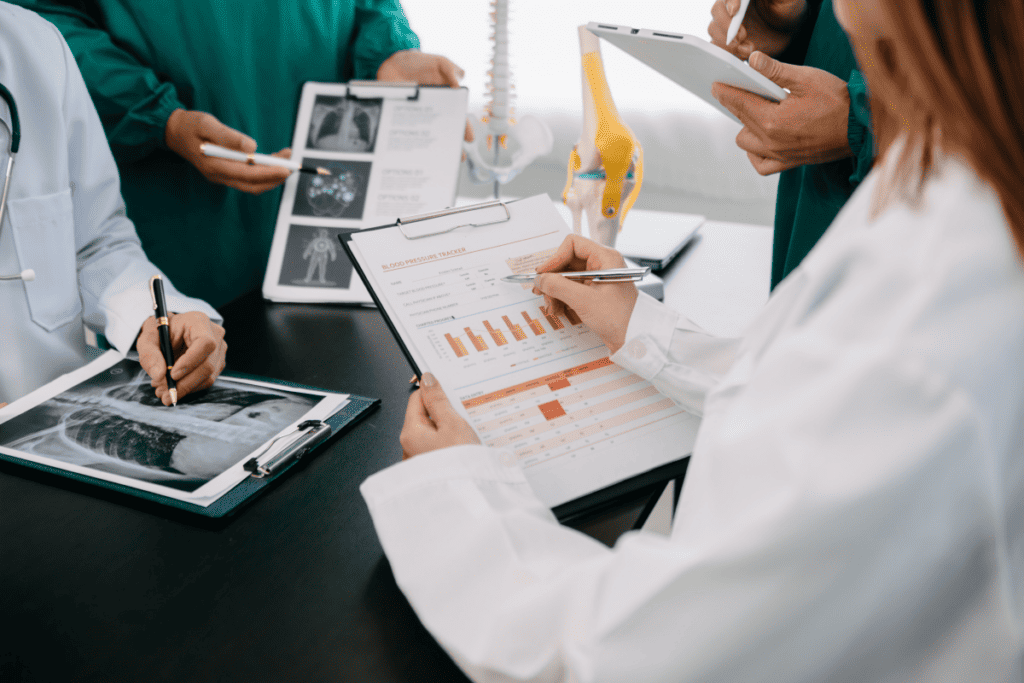What are Opioids?
Opioids are a family of drugs that include oxycodone, hydrocodone, codeine, and heroin. These drugs can be used legally to treat pain and can also be obtained illegally. When opioids are taken over an extended period or taken in large doses, dependence may occur, and the body develops a tolerance for the drug. Opioid analgesics can be very effective for treating pain, but they also carry a high risk of drug abuse and misuse.
Commonly Prescribed Opioid Painkillers
- Oxycodone (Percocet or OxyContin)
- Hydrocodone (Vicodin)
- Codeine
- Morphine
- Fentanyl (Actiq or Sublimaze)
- Tramadol (Ultram)
- Methadone
- Hydromorphone
- Tapentadol (Nucynta)

Opioid Addiction
Over 2.7 million people struggle with opioid addiction in the United States each year, according to information from the National Survey on Drug Use and Health. That’s roughly 1 in every 100 people in the entire country. The very nature of opioid use disorder makes breaking free from addiction a monumental task, but a detox program and the following substance abuse treatment can make the process much simpler.
Opioid addiction is a severe mental health disorder that can cause structural brain changes that make it increasingly difficult for people to stop on their own. Furthermore, many people suffer severe withdrawal symptoms if they suddenly stop using, making the path to abstinence a difficult road. Medically supervised detox can substantially reduce withdrawal symptoms and help people start their recovery off on the right foot. In addition, it can help people transition into opioid dependence treatment programs that help them build the skills they need to maintain their recovery long-term.
The Consequences of Addiction To Opioids
Opioids are a leading cause of death in the United States. Substance abuse is a severe disorder that can have drastic consequences. People who struggle with this addiction may experience:
- Extreme difficulty functioning in day-to-day life due to substance use
- Social isolation, as they spend more and more time using opioids
- Financial challenges, as paying for drugs becomes a priority
- Risk-taking behavior, as opioid users may resort to illegal activities to get the drugs they need
- Cognitive impairment, as opioids can cause brain changes that affect memory and decision-making
Severe opioid addiction often places individuals at risk of overdosing. Despite these consequences, many continue to abuse opioids and face more demanding challenges as the years go on. However, people can recover with the help of opioid treatment programs at drug and alcohol addiction treatment centers.
Opioid Addiction Warning Signs
If you suspect that someone is struggling with opioid dependence, there are a few key warning signs to look out for:
- Dramatic changes in behavior, such as increased isolation or anxiety
- Unexplained financial difficulties
- Loss of interest in hobbies, activities, and relationships that were once enjoyed
- Use of multiple doctors to get more opioid prescriptions
- Regularly using opioids or other drugs in combination with alcohol
- Overdosing, hospital visits due to substance use issues, or run-ins with the law
If you notice any of these addiction symptoms or signs of opioid withdrawal, seeking help from a treatment center as soon as possible is essential. With the proper support, individuals can get clean and start their journey to recovery.
Opioid Withdrawal Symptoms
Untreated opioid withdrawal is a harrowing and painful experience. Even a short amount of time using opioid drugs can result in physical dependence. During opiate withdrawal, several physical and psychological symptoms stack on top of each other, making the first days of abstinence exceptionally difficult to break through. Acute opioid withdrawal symptoms include:
- Muscle aches and pains
- Shakes
- Hot and cold flashes
- Restlessness
- Intense drug cravings
- Nausea
- Vomiting
- Diarrhea
- Chronic pain
- Sneezing
- Runny nose
- Goosebumps
- Depression
Opiate withdrawal symptoms peak about three days after a person last used opiates and can last up to ten days or longer. The symptoms vary in intensity depending on the time a person has been using and the amount they have consumed.
The severity of opioid withdrawal symptoms can overwhelm even the most determined person attempting to achieve sobriety and cause them to cave back into active addiction. Relapse is common When people face too many symptoms to handle independently. Fortunately, an addiction treatment center can provide medication-assisted treatment to reduce opioid withdrawal symptoms and help individuals transition into longer-term treatment programs for recovery.

Opioid Detox and Addiction Treatment
The opiate detox programs at our Los Angeles Drug Rehab Center for opioid abusers offer a comfortable medical setting for detox services for those with physical opioid dependence. The opioid detoxification process is designed to help individuals with opioid addiction break their physical and psychological dependence. Our certified medical staff uses evidence-based therapies, including medications, nutritional support, psychotherapy interventions, individual and group therapy sessions, and relapse prevention strategies.
We understand that detoxing can be complicated on both a mental and physical level. By providing education, support, and lifestyle changes throughout residential treatment, we hope to help opioid-dependent patients develop a healthier foundation for recovery from substance use disorder.
Before Detox
A detox process begins with evaluating a person’s mental and physical health. During this time, our medical professionals will assess any potential risks, including underlying health issues or mental health conditions that can complicate recovery. With knowledge of the individual’s medical history, we can develop a personalized plan to ensure safety throughout the process. Our assessments include:
- A comprehensive medical evaluation to create a tailored treatment plan
- Blood samples, urine tests, blood pressure tests, and other applicable lab tests
- Selection of commonly prescribed medications used in detox settings to help as you experience withdrawal symptoms
Once a client is assessed, the detox process will occur with medical assistance from our healthcare providers. Medical supervision and guidance help clients feel safe and comfortable. To learn more about the intake process at our recovery center, call (888) 915-5708 or reach out to us via our secure online form.
During Detox
During detox, medication-assisted treatment (MAT) services are incorporated to ease opioid withdrawal symptoms and cravings. Our detox team monitors patients to ensure their safety and comfort. Our goal is to make the detox process as comfortable and efficient as possible. We may recommend a 7-day or 30-day detox program, depending on your unique needs.
Throughout that time, we will provide you with addiction medicine, therapies, and individualized substance abuse treatment to address opiate dependence and co-occurring mental health issues such as bipolar disorder or PTSD and learn coping skills for long-term recovery from addictive substances.
The duration of the detox timeline depends on various factors such as the type and amount of opioids used if other drugs were abused along with opioids, and the individual’s physical and mental health. It can take anywhere from several days to weeks for your body to rid itself of all opioid toxins. Below is an example of the detox timeline during addiction treatment:
Day 1
Begin the detox process with physical and mental assessments. Addiction specialists may prescribe medications to help manage withdrawal symptoms, such as irritability, nausea, muscle aches, anxiety, depression, and insomnia.
Days 2-3
You may experience intense cravings for the drug as well as acute withdrawal symptoms. An opioid antagonist, such as intramuscular or oral naltrexone or methadone treatment, may be integrated to help reduce cravings and withdrawal symptoms.
Days 4-7
You will likely experience the peak of your withdrawal symptoms during this time. An experienced medical team will continue to monitor your progress and adjust medications accordingly.
Days 8-10
Most individuals should feel more comfortable as the acute withdrawal symptoms begin to subside.
Days 11-14
You may still experience cravings and mild withdrawal symptoms, but they should be improving at this point.
Day 15+
Your physical and mental health should improve significantly as you move through the detox process. Naltrexone maintenance treatment or methadone maintenance may be incorporated as you adjust to life without opioids. Medical professionals will continue to monitor your progress and provide any necessary treatments.
Opioid detox is an essential part of addiction recovery as it helps to break the physical dependence on opioid use. At our Los Angeles opioid detox center, we understand how complicated this process can be, so we provide comprehensive care and support every step of the way. If you or someone you know needs opioid detox services, contact us today at (888) 915-5708. We are here to help!
After Detox
After successful detoxification from opioids, you will spend the next few weeks transitioning into an appropriate treatment program to increase your chances of long-term recovery. While deciding to seek treatment for opioid addiction can be a difficult one, once you have made that choice, it’s equally essential to be placed in the right level of care.
Clients can continue their treatment with residential treatment or an outpatient program. While both options are available, clients are typically encouraged to participate in residential treatment, where they receive around-the-clock care and support during this next stage of recovery.
- Individual therapy
- Group therapy
- Family therapy
- Cognitive Behavioral Therapy (CBT)
- Dialectical Behavioral Therapy (DBT)
- Trauma-informed care
- Dual diagnosis treatment services
- Medication-assisted treatment (MAT)
- Holistic therapies such as yoga, mindfulness, and meditation
- Aftercare programs to encourage long-term sobriety
Our goal is to ensure that following withdrawal symptoms from opioids, clients receive the most effective and comprehensive care available with the necessary resources, support systems, and relapse-prevention strategies to maintain a life of sobriety. With the help of our experienced professionals, you can make lasting changes in your life and remain abstinent.
Detoxing at Home is Dangerous
Many people will attempt to detox themselves at home when they determine that their opioid use has become problematic. Detoxing from opioids on your own can be extremely dangerous and even fatal. Without medical supervision and therapy, it can be difficult to safely manage common symptoms of withdrawal and reduce the risk of relapse during this often complex process.
One of the key diagnostic features of an opioid use disorder, as defined in the Diagnostic and Statistical Manual of Mental Disorders, is “a persistent desire or unsuccessful efforts to cut down or control opioid use.” Attempting to detox on your own — and not being able to — is in the definition of what it means to have an opioid use disorder.
Additionally, there are many risks of detoxing at home. People going through opioid withdrawal face severe and mild symptoms that can be serious and even fatal without medical treatment. Symptoms can include but are not limited to nausea, vomiting, diarrhea, stomach pain, sweating, chills or fever, flu-like symptoms, muscle or joint pain, anxiety, or depression.
The safest way to detox from opioids is in an opioid detox center where medical professionals can monitor and treat individuals as they withdraw.
At our opioid detox center, medically supervised detox is provided in a safe and comfortable environment. Our team of professionals is available 24 hours a day to provide medical assistance and emotional support as needed. With our help, detox can be made much more comfortable and successful.

How Our Medical Opioid Detox Can Help with Drug Abuse
Our opioid detox center offers a safe and supportive environment for people ready to take the first step toward recovery. Through medical supervision, individuals will be monitored and supported through the complex process of opioid withdrawal. Our inpatient opioid detox provides 24-hour support and medical guidance while ensuring safety from relapse.
Opiate addiction treatment has come a long way in recent years. Thanks to the development of targeted opioid withdrawal medications, severe withdrawal symptoms can be significantly reduced or even eliminated during the treatment process.
But medications to improve treatment outcomes aren’t all our medical detox can do for you. Several other benefits make attending our opioid detox center the right choice for those with opioid abuse disorder.
From symptoms of withdrawal to treatment program types to payment and insurance benefits, we are here to help you each step of the way. We offer a variety of treatment models, opioid addiction therapy options, support groups, and counseling services to enhance your treatment experience and ensure that you get the most out of your time with us. Some of our benefits include the following:
- Medical monitoring of all withdrawal symptoms, including the use of medication-assisted treatment.
- Dual-diagnosis treatment options to address any mental illness in addition to opioid abuse, also known as co-occurring disorders.
- Nutritional meals that meet any dietary restrictions and help your body and mind heal.
- Individual and group therapy to help address common issues like substance abuse, depression, anxiety, and trauma.
- Support groups like Narcotics Anonymous to enhance your recovery community and help you find others struggling with opioid use disorder.
- An array of medical and addiction professionals assist in case management, treatment plans, and other medical needs.
Drug Rehab in Los Angeles for Addiction
Take the first step toward opioid addiction recovery by contacting our drug rehab in Los Angeles, CA – (888) 915-5708. With the right care, you or your loved one can safely and effectively navigate the challenges of drug addiction and associated mental health disorders and achieve sustainable recovery.
Our treatment center accepts most private health insurance plans and some public health policies. A professional treatment provider on our team is available to work with your insurance provider to assist you in navigating your insurance coverage to minimize any out-of-pocket expenses. If you don’t have insurance coverage, we can help you learn what treatment options are available to you or your loved one.